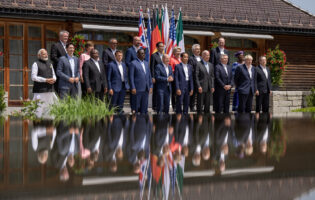Elections and Party Competition in Comparison: Germany and the U.S.
German voters favor a more consensus-oriented style of politics than voters in the United States, but it is clear that campaigning in both have become more similar in recent years. These ideas as well as the likelihood of a grand coalition, the state of transatlantic relations, and several domestic issues were the focus of the conversation on October 21, 2013 at the AGI workshop “Elections and Party Competition in Comparison: Germany and the U.S.” The workshop was co-hosted with a group of scholars from the NRW School of Governance of the University Duisberg-Essen led by Dr. Karl-Rudolf Korte, one of Germany’s leading authorities on electoral politics. Speakers from the NRW School included Andreas Blätte, Martin Florack, Frank Gadinger, and Kristina Weissenbach, and were joined by Bruce Stokes of the Pew Research Center, and Jack Janes, Gale Mattox, and Parke Nicholson from AGI.
The discussion started with a comparative analysis of the increasing personification of recent German elections, as many voted for Angela Merkel instead of the CDU. This focus on an individual rather than a party is similar to campaigns in the United States. The seriousness of the right-wing movement in both countries was also debated. Some workshop participants believed the movement to be of great concern for Germany, while others predicted the right-wing parties will lose momentum as soon as the large Volksparteien begin to discuss the issues concerning EU policies.
Surprisingly, some of the participants put the chances of a grand coalition at only 50 percent, which contradicts popular opinion. This could force Chancellor Merkel to lead a minority government. One argument for this view was that the SPD would likely demand terms the CDU would refuse to accept and that the CDU will never go further on environmental policy than it already has. Some also expressed concern that voters could get tired of Merkel’s leadership during a third term, and that any potential grand coalition might not survive four years. Workshop participants were divided on the prospects of the FDP, with some believing liberalism to be dead in Germany, while others predict a comeback.
On the second panel, both Gale Mattox and Martin Florack agreed that foreign policy was not a central issue in the German or U.S. elections. This was partly due to the media’s failure in both countries to accurately inform the public, though the strict separation of media opinion into conservative or liberal networks is more prominent in the United States than in Germany. Both speakers also wanted to see Germany become more proactive in foreign policy. Germans have become too complacent and important issues are being ignored, which is reflected both in its foreign policy as well as the elections.
The third panel addressed the balance between freedom and security, social welfare reform, and the immigrant vote. Frank Gadinger’s presentation pointed out that despite some cultural differences in the understanding of the war on terror, there is a general consensus in both Germany and the United States concerning the need to defend national security with all necessary means. Thus, despite media attention on the use of drones or NSA programs, there is not much pressure for policy change in the political discourse. Kristina Weissenbach discussed reforming the welfare state and stated that the public has resisted calls from politicians to “slim down” the welfare system. With the conservative CDU dominating the incoming government, major reform on welfare is unlikely to take place. Andreas Blätte’s presentation explained the growing impact of immigrant voters in German elections. The major parties in Germany have all started to push for immigrant and minority representation in state and federal parliaments. A more comprehensive and easier naturalization path for immigrants will lead to more balanced political representation. Commenting on the panel’s presentations, Bruce Stroke gave insights on the constant gridlock in U.S. politics. He used Pew Research Center polling data to show how the American electorate has become more polarized on a variety of issues in recent decades.
| DATE: | Monday, October 21, 2013 |
| TIME: | 12:00pm – 5:00pm |
| LOCATION: | AGI |
| 1755 Massachusetts Avenue, NW, Suite 700 | |
| Washington, DC 20036 |
Any questions should be directed to Kimberly Frank at kfrank@aicgs.org.
Relevant AGI publications include:
Beyond the Elections: Merkel’s Coalition Challenges
Merkel’s Triumph: Relief for the Euro and the Economy







